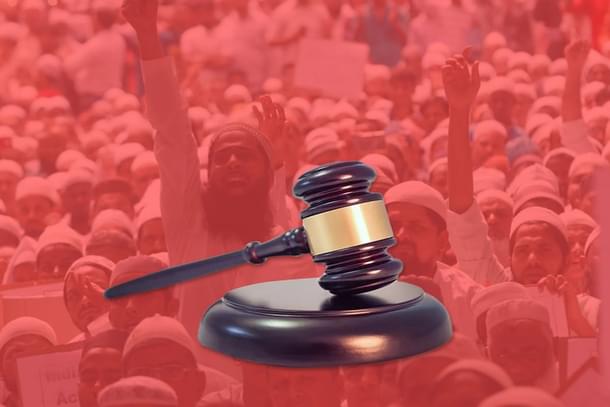Commentary
Why Justice Shekhar K. Yadav’s Speech Is Constitutional And Progressive
Monalisa Nanda and Aayush Pandey
Dec 11, 2024, 05:48 PM | Updated 05:48 PM IST
Save & read from anywhere!
Bookmark stories for easy access on any device or the Swarajya app.


“What is morally wrong cannot be legally right” - the Supreme Court bench observed in Shayara Bano v. Union of India (2017)
With these searing words, the Supreme Court of India ruled that no tradition, however hallowed by time or clerical endorsement, may stand if it tramples upon fundamental rights.
Justice Shekhar K. Yadav’s recent remarks echo this judicial resolve that rejects the pernicious influences of self-proclaimed guardians of faith who seek to shield abusive, dehumanising customs under the veneer of religious law. His instance, if anything, defends the very spirit of constitutionalism.
At the heart of this discourse lies a fundamental question - whether a judge, sworn to uphold the Constitution, must remain silent in the face of established inequalities disguised as religious norms or whether it is permissible, even incumbent, upon him to restate, for the edification of the citizenry, core constitutional values that transcend parochial and regressive practices.
Understanding the Constitutional Basis of Justice Yadav’s Words
In a society built on the principles of justice and equality, the law must serve as an equalizing force, ensuring that no individual or group is treated unfairly. The Constitution of India incorporates this fundamental vision through a series of provisions aimed at safeguarding the rights of every citizen, regardless of their background or identity.
Under Article 14 of the Constitution of India, the State is obliged to ensure equality before the law and the equal protection of laws. Similarly, Article 15 prohibits discrimination on grounds of religion, race, caste, sex or place of birth, and Article 21 protects the right to life and personal liberty, which has been expansively interpreted to include the right to live with dignity.
The remarks of Justice Shekhar K. Yadav, wherein he stressed on the necessity of a Uniform Civil Code (UCC), the protection of women’s fundamental rights in matrimonial and family matters, and the imperative to resist the dictates of extremist elements masquerading as religious authority, must be understood against the above constitutional canvas.
A closer and more nuanced examination of his remarks reveals that they are rooted in well-established constitutional principles and judicial precedents, and are reflective of global efforts to harmonise religious personal laws with universal standards of human rights.
The Judge’s highlighting of women’s rights to maintenance and a fair matrimonial framework are very similar with the jurisprudence of the Supreme Court of India, which has repeatedly affirmed that personal laws cannot trump constitutional values.
In the case of Bai Tahira v. Ali Hussain Fidaalli Chothia (1979), the Supreme Court ruled that Section 127 of Cr.P.C. does not completely relieve a husband from his duty to provide maintenance to a financially needy ex-wife if the support he offers under personal law is inadequate for her sustenance.
In Shayara Bano v. Union of India (2017), the Supreme Court declared the practice of instant triple talaq unconstitutional, and held that such a custom violated the fundamental rights of Muslim women to equality and dignity.
Thus, Justice Yadav’s remark that “A woman has a fundamental right to receive maintenance if her husband divorces or separates from her. If you claim this is not in your Shariat, I must assert my stance without hesitation” aligns with the Supreme Court’s approach that ensures that personal laws do not become instruments of oppression or discrimination.
To be sure, concerns have been raised regarding the language employed by Justice Yadav, particularly, the invocation of the term “kathmullas” to describe those who mislead the youth and thwart the progress of the nation. Such terms should not be confused with a broad denunciation of Islam or its adherents as a religious community. Rather, it draws a necessary distinction between the faith itself and those radical, fundamentalist ideologues who seek to impose a rigid, patriarchal, and regressive interpretation of religious norms.
Evolving Norms in Religious Personal Laws in the World
The tension between religious personal laws and overarching constitutional or human rights frameworks is neither novel nor confined to a single jurisdiction. Historically, various legal systems have grappled with such questions with the emerging norms of gender justice, non-discrimination, and individual liberty.
An instructive parallel to the conversation put by Justice Shekhar can be drawn from the United Kingdom’s struggle with non-state arbitration forums, including Sharia Councils, which have sometimes been criticized for issuing decisions that marginalize women’s right in matrimonial and inheritance disputes.
In December 2016, over 300 women came forward with accounts of how these parallel bodies failed to secure equal justice for them. It effectively compelled them into unfair settlements and perpetuated patterns of abuse and inequality.
Civil society initiatives, most notably, the “One Law for All” campaign led by human right activist Maryam Namazie have called upon the British government to ensure all citizens, regardless of religious affiliation, are subjected to a single, uniform legal standard enshrined in secular law.
The impetus for uniformity in the UK does not arise from hostility towards Islam or any other faith, rather, it springs from the recognition that fundamental rights cannot be subject to private arbitrations that may reflect coercive power dynamics.
In 2010, former German Chancellor Angela Merkel had remarked that Muslims must obey the constitution and not Sharia law if they want to live in Germany. The German constitution is built on the inviolability of human dignity.
The predicament faced by Justice Shekhar in India is not without analogues elsewhere. American courts have held that even deeply rooted religious practices cannot contravene the Constitution’s guarantee of equal protection, as illustrated in cases related to polygamy among certain religious sects in Reynolds v. United States (1878).
In Canada’s Quebec, Sharia is explicitly banned by the National Assembly, and Ontario allows family disputes to be settled only under Ontario law.
Addressing the Code of Judicial Conduct
In India, the judicial conduct finds its articulation in “Restatement of Values of Judicial Life”, adopted by the Supreme Court in 1997, which, while not statutory in nature, serves as a moral and ethical compass showcasing the role of a judge as the custodian of constitutional values.
These guidelines reflect a deep-rooted tradition shared by many common law jurisdictions, including the United Kingdom and the United States, where judicial ethics codes guide the judge towards dignity, neutrality, and restraint.
In the United States, for instance, the Code of Conduct for United States Judges similarly mandates impartiality and the avoidance of public comment on pending cases, yet acknowledges the judge’s role in clarifying legal principles and educating the public on matters essential to justice.
After Justice Shekhar remarks, many contended that by specifically referencing certain religious communities and practices, he risked undermining the perception of impartiality. However, it must be noted that impartiality does not imply moral, ethical, or constitutional agnosticism. A judge who vigorously defends the right of women to receive maintenance, for example, is hardly seen as taking sides in a political debate, rather, he is vindicating a constitutionally guaranteed right and reaffirming the principle of equality before the law.
The judges are not required to maintain a monastic silence on all matters of public concern. The judicial function is inherently dignified by the clarity of purpose and fidelity to constitutional values it projects.
The judiciary, as the guardian of the Constitution, is entitled, and arguably obliged, to reiterate the values of equality, non-discrimination, and human rights, when they are under threat, be it from extremist elements or entrenched patriarchal norms. What Justice Yadav did, then, could be viewed as a careful delineation of constitutional imperatives, not a dalliance into partisan controversy.
The judicial codes across the world, including India’s Restatement, were crafted against the backdrop of ensuring that judges do not become political actors. They were never intended to gag the judiciary from reinforcing the normative boundaries set by the Constitution.
By challenging extremist interpretations that undermine human rights, a judge holds the higher calling of judicial office i.e. to be not merely a passive arbiter, but a vigilant guardian of constitutional morality.
It vindicates the essence of what the Restatement of Values of Judicial Life and parallel codes in other jurisdictions seek to achieve—a judiciary that remains both above the political fray and attuned to the imperatives of justice, equality, and human dignity.
Secularism vs. Clericalism and’ the ‘Kathmulla’ Mindset
When Justice Shekhar criticizes “kathmullas”, he is not maligning the Islamic faith or its adherents. Instead, he is calling out those who manipulate religion to perpetuate harmful, outdated practices that can strip individuals, often women, of their basic freedoms.
When justice-seeking voices, from judges to civil society activists, challenge practices like nikah halala, triple talaq, or polygamy, they are not engaging in anti-religious propaganda. Instead, they are invoking the constitutional ethic that no personal law, however venerable or historically rooted, may stand if it contradicts the overarching guarantee of equality and dignity. Article 14, 15 and 21, taken together lay the foundation of a jurisprudence that compels the judiciary to examine the personal law from the lens of human dignity.
When Justice Shekhar says that India will function as per will of the majority, here, the majority wishes are not simply brute numbers, but they are filtered through a constitutional framework. It means that public policy cannot be held hostage by the fringe within any community.
India is a representative democracy, where legitimate authority stems from the will of the electorate, and not a theocracy. Its Constitution is the supreme legal charter, and its promise of liberty and equality is not an empty slogan but a living, breathing command that must animate the entire legal order.
Will We Stand by the Vulnerable or Yield to Extremists?
One might ask - if religious law can be an evolving entity, shifting and adapting over centuries, should India’s constitutional democracy remain shackled to outmoded practices that no longer align with the contemporary human rights standards? Is it truly “pro-minority” or “pro-faith” to cling to halala, triple talaq, and polygamy - practices that have been widely repudiated by many Muslim-majority countries themselves?
If the Constitution bestows equal rights on all, does defending these practices not amount to tacitly endorsing violations of these very rights?
Ultimately, this is not about one judge’s choice of words or speech. It is about the underlying truth that customs, while sacrosanct, cannot legitimize practices that compromise human dignity.
To that end, Justice Yadav’s speech, straightforwardly, urges us to look beyond narrow readings. Perhaps it is time to recognise that in defending the victims of religious abuse, we are not attacking a community’s identity but affirming the foundational principles that make India a constitutional democracy governed by the rule of law, and not the rule of extremists be it religious or otherwise.
To reject Justice Yadav’s stance is, in effect, to reject the Constitution’s promise of equality. It is to oppose the progressive jurisprudence that has steadily dismantled unjust practices and expanded the rights of marginalized groups. His words may provoke discomfort, but they compel us to confront uncomfortable truths about the persistence of injustice in the name of religion. To oppose him is to support injustice.
Monalisa Nanda is a lawyer and public policy consultant. Aayush Pandey is a final year law student at Gujarat National Law University.





